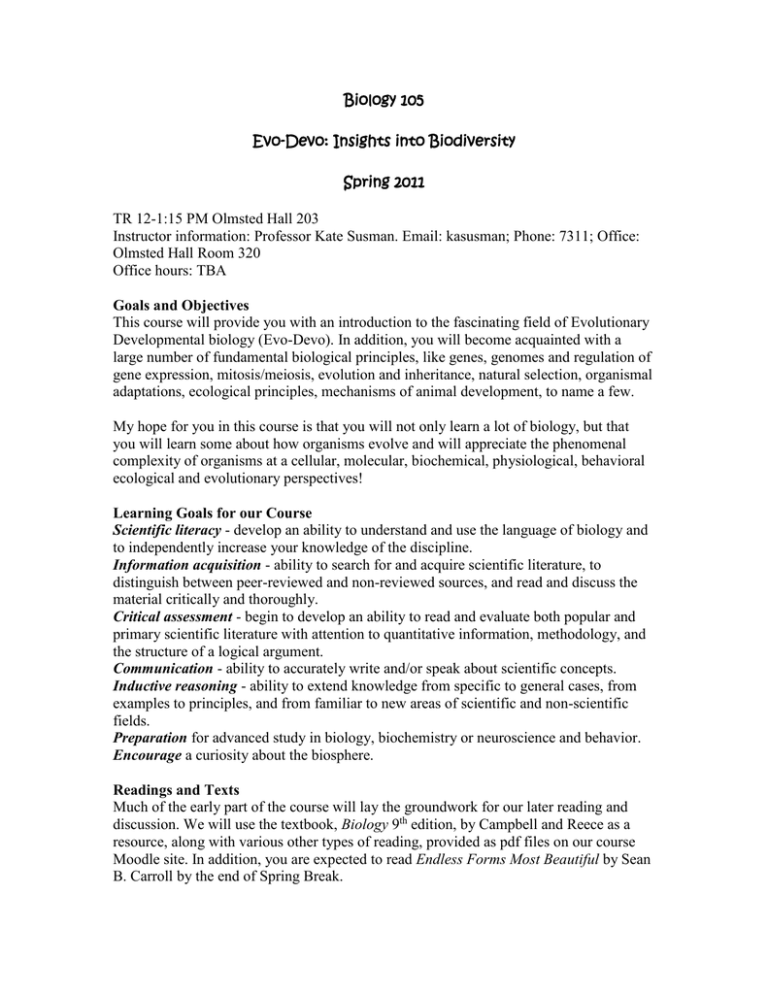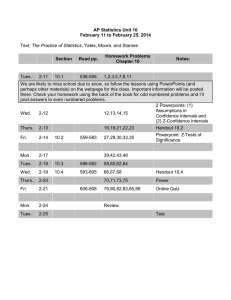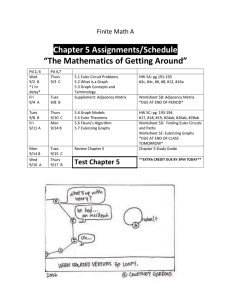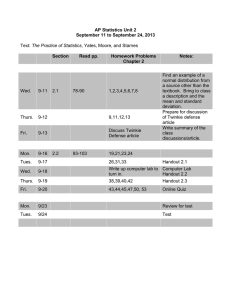Biology 105 Evo-Devo: Insights into Biodiversity Spring 2011
advertisement

Biology 105 Evo-Devo: Insights into Biodiversity Spring 2011 TR 12-1:15 PM Olmsted Hall 203 Instructor information: Professor Kate Susman. Email: kasusman; Phone: 7311; Office: Olmsted Hall Room 320 Office hours: TBA Goals and Objectives This course will provide you with an introduction to the fascinating field of Evolutionary Developmental biology (Evo-Devo). In addition, you will become acquainted with a large number of fundamental biological principles, like genes, genomes and regulation of gene expression, mitosis/meiosis, evolution and inheritance, natural selection, organismal adaptations, ecological principles, mechanisms of animal development, to name a few. My hope for you in this course is that you will not only learn a lot of biology, but that you will learn some about how organisms evolve and will appreciate the phenomenal complexity of organisms at a cellular, molecular, biochemical, physiological, behavioral ecological and evolutionary perspectives! Learning Goals for our Course Scientific literacy - develop an ability to understand and use the language of biology and to independently increase your knowledge of the discipline. Information acquisition - ability to search for and acquire scientific literature, to distinguish between peer-reviewed and non-reviewed sources, and read and discuss the material critically and thoroughly. Critical assessment - begin to develop an ability to read and evaluate both popular and primary scientific literature with attention to quantitative information, methodology, and the structure of a logical argument. Communication - ability to accurately write and/or speak about scientific concepts. Inductive reasoning - ability to extend knowledge from specific to general cases, from examples to principles, and from familiar to new areas of scientific and non-scientific fields. Preparation for advanced study in biology, biochemistry or neuroscience and behavior. Encourage a curiosity about the biosphere. Readings and Texts Much of the early part of the course will lay the groundwork for our later reading and discussion. We will use the textbook, Biology 9th edition, by Campbell and Reece as a resource, along with various other types of reading, provided as pdf files on our course Moodle site. In addition, you are expected to read Endless Forms Most Beautiful by Sean B. Carroll by the end of Spring Break. ** Please note: You will need to review the following chapters of our biology text on your own the first week of class: Ch. 2, 3, 4, 5. My assumption is that you have encountered these concepts before coming to college biology. If you have questions on any of this background material, please come to my office hours or make an appointment by the second week of classes. Expectations and Grading 40% Midterm Examinations- There will be two midterm examinations that will examine your mastery of biological concepts. 15% Poster Presentation: With a partner, you will choose an example organism to investigate possible Evo-Devo-related change. Explore the 1) life history and ecology, 2) phylogeny, 3) postulated gene regulation changes. You and your partner will prepare a scientific poster presentation of your research on this organism, supported by at least five sources, including two primary articles published in the past 5 years. Sign up 4th week of class. More information to follow. 20% Final Examination-This examination will be cumulative and will be scheduled by the Registrar. 10% Endless Assignment- More information will be provided in class. 15% Small Assignments, Participation and Class Attitude- I will assign in-class group work, in-class writings and homework throughout the semester in order to help you keep up with the course material. Late assignments will incur a 5% penalty per day, including weekend days and will NOT be accepted more than two weeks after they are due. In addition, part of your course grade will be from class participation and your overall approach to the course. The course will be very discussion-oriented, so it is important that you come to class prepared and willing to participate verbally. This means that class attendance is required. There is no make-up work for missed classes. You will get the most out of your biology experience if you come to class excited to participate! Here is a reminder of what final grades at Vassar are intended to indicate, from the Vassar catalogue: A indicates achievement of distinction. It involves conspicuous excellence in several aspects of the work. B indicates general achievement of a high order. It also involves excellence in some aspects of the work, such as the following: Completeness and accuracy of knowledge Sustained and effective use of knowledge Independence of work Originality C indicates the acceptable standard for graduation from Vassar College. It involves in each course such work as may fairly be expected of any Vassar student of normal ability who gives to the course a reasonable amount of time, effort, and attention. Such acceptable attainment should include the following factors: Familiarity with the content of the course Familiarity with the methods of study of the course Evidence of growth in actual use both of content and method Full participation in the work of the class Evidence of an open, active, and discriminating mind Ability to express oneself in intelligible English C–, D+, and D indicate degrees of unsatisfactory work, below standard grade. They signify work which in one or more important respects falls below the minimum acceptable standard for graduation, but which is of sufficient quality and quantity to be counted in the units required for graduation. Work evaluated as F may not be counted toward the degree. I remind us all of this rubric to emphasize that there are expectations set forth by the College that are directly relevant to the processes we will address throughout the semester. Academic Honesty For your own education and for fairness to the rest of the students in the class, it is essential that you perform your work yourself and conduct yourself with honesty and integrity. Your written work must be your own, not plagiarized or closely paraphrased from other sources, including the internet. When you use figures or images from other sources, you must properly attribute your sources. It is very easy and tempting to use the internet to assist you in completing assignments, so you must be very careful to ensure that your work for the course is the result of your own thinking and your own efforts. Students with Differing Abilities Academic accommodations are available for students with differing abilities who are registered with the Office of Disability and Support Services. Please schedule an appointment with us early in the semester to discuss any accommodations for this course which have been approved by the Director of Disability and Support Services as indicated in your DSS accommodation letter. Calendar Week/dates 1/20 (Thurs) Topic Readings Evo-Devo and Introductions Be sure to complete Ch. 2-5 on own time 1/25 (Tues) Levels of biological organization, interactions and connections, variations in traits Ch. 1 Campbell 1/27 (Thurs) Evolution: natural selection, genetic drift Ch. 22 Campbell 2/1 (Tues) Evolution of populations Speciation and complexities of the concept of species Reverse Evolution? Ch. 23, 24 Campbell; Staley2009.pdf Genes and proteins: Molecular Basis of Inheritance Gene expression-cellular mechanisms Ch. 16, 17 2/15 (Tues) Gene expression and its regulation Ch. 18 2/17 (Thurs) Regulation of gene expression- CREs Ch. 18 2/22 (Tues) Inheritance of genes: Cell cycle and its regulation Inheritance of genes: Mitosis and Meiosis Ch. 12, 13 2/3 (Thurs) 2/8 (Tues) 2/10 (Thurs) 2/24 (Thurs) 3/1 (Tues) 3/3 (Thurs) MIDTERM I Genomes and phylogenies SPRING BREAK Kitano2008.pdf Ch. 17 Ch. 12, 13 Ch. 21, 26 3/22 (Tues) Genomes and evolution; What Makes us Human? Cell communication Ch. 21; Pollard2009.pdf 3/29 (Tues) 3/31 (Thurs) Cell communication Focus on Animal form and function; Begin Development Ch. 6, 7, 11 Ch. 40, 47 4/5 (Tues) Animal development 4/7 (Thurs) Hox genes Ch. 47; KoshibaTakeuchi2009.pdf Matsunami et al, 2010.pdf 4/12 (Tues) 4/14 (Thurs) Midterm II Endless Forms Most Beautiful 4/19 (Tues) 4/21 (Thurs) Student poster presentations A close look at Evo-devo studies First half of class Jeffrey2008.pdf; Steiner2007.pdf 4/26 (Tues) 4/28 (Thurs) Student poster presentations Insights from Evo-devo Second half of class Hay 2008.pdf; Boisvert2009.pdf 5/3 (Tues) Evo-devo: Critique and Response Hoekstra and Coyne, 2007.pdf; Carroll2008.pdf 3/24 (Thurs) Ch. 6, 7, 11 Carroll’s book Course resources • Moodle: We have a course Moodle site that you will need to consult regularly for course announcements, assigned readings and an up-to-date copy of the course syllabus (which is subject to change). • Online reserve service through VC Libraries Important journals: Current Opinion in Biology, Science, Nature….





